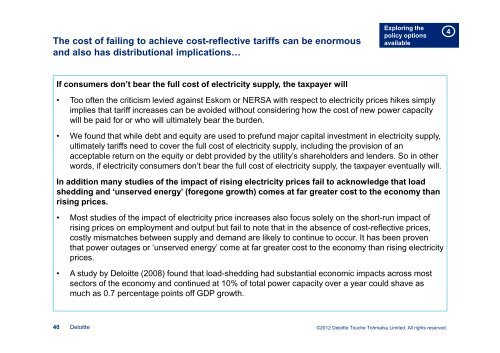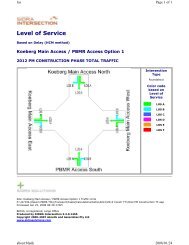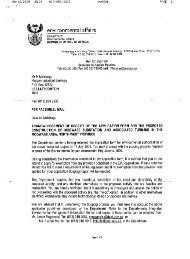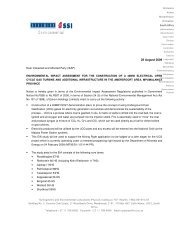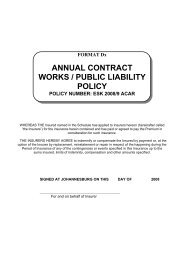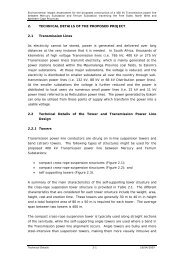The Economic Impact of Electricity Price Increases on ... - Eskom
The Economic Impact of Electricity Price Increases on ... - Eskom
The Economic Impact of Electricity Price Increases on ... - Eskom
You also want an ePaper? Increase the reach of your titles
YUMPU automatically turns print PDFs into web optimized ePapers that Google loves.
<str<strong>on</strong>g>The</str<strong>on</strong>g> cost <str<strong>on</strong>g>of</str<strong>on</strong>g> failing to achieve cost-reflective tariffs can be enormous<br />
and also has distributi<strong>on</strong>al implicati<strong>on</strong>s…<br />
If c<strong>on</strong>sumers d<strong>on</strong>’t bear the full cost <str<strong>on</strong>g>of</str<strong>on</strong>g> electricity supply, the taxpayer will<br />
• Too <str<strong>on</strong>g>of</str<strong>on</strong>g>ten the criticism levied against <strong>Eskom</strong> or NERSA with respect to electricity prices hikes simply<br />
implies that tariff increases can be avoided without c<strong>on</strong>sidering how the cost <str<strong>on</strong>g>of</str<strong>on</strong>g> new power capacity<br />
will be paid for or who will ultimately bear the burden.<br />
• We found that while debt and equity are used to prefund major capital investment in electricity supply,<br />
ultimately tariffs need to cover the full cost <str<strong>on</strong>g>of</str<strong>on</strong>g> electricity supply, including the provisi<strong>on</strong> <str<strong>on</strong>g>of</str<strong>on</strong>g> an<br />
acceptable return <strong>on</strong> the equity or debt provided by the utility’s shareholders and lenders. So in other<br />
words, if electricity c<strong>on</strong>sumers d<strong>on</strong>’t bear the full cost <str<strong>on</strong>g>of</str<strong>on</strong>g> electricity supply, the taxpayer eventually will.<br />
In additi<strong>on</strong> many studies <str<strong>on</strong>g>of</str<strong>on</strong>g> the impact <str<strong>on</strong>g>of</str<strong>on</strong>g> rising electricity prices fail to acknowledge that load<br />
shedding and ‘unserved energy’ (foreg<strong>on</strong>e growth) comes at far greater cost to the ec<strong>on</strong>omy than<br />
rising prices.<br />
40<br />
• Most studies <str<strong>on</strong>g>of</str<strong>on</strong>g> the impact <str<strong>on</strong>g>of</str<strong>on</strong>g> electricity price increases also focus solely <strong>on</strong> the short-run impact <str<strong>on</strong>g>of</str<strong>on</strong>g><br />
rising prices <strong>on</strong> employment and output but fail to note that in the absence <str<strong>on</strong>g>of</str<strong>on</strong>g> cost-reflective prices,<br />
costly mismatches between supply and demand are likely to c<strong>on</strong>tinue to occur. It has been proven<br />
that power outages or ‘unserved energy’ come at far greater cost to the ec<strong>on</strong>omy than rising electricity<br />
prices.<br />
• A study by Deloitte (2008) found that load-shedding had substantial ec<strong>on</strong>omic impacts across most<br />
sectors <str<strong>on</strong>g>of</str<strong>on</strong>g> the ec<strong>on</strong>omy and c<strong>on</strong>tinued at 10% <str<strong>on</strong>g>of</str<strong>on</strong>g> total power capacity over a year could shave as<br />
much as 0.7 percentage points <str<strong>on</strong>g>of</str<strong>on</strong>g>f GDP growth.<br />
Deloitte<br />
Exploring the<br />
policy opti<strong>on</strong>s<br />
available<br />
©2012 Deloitte Touche Tohmatsu Limited. All rights reserved.<br />
4


